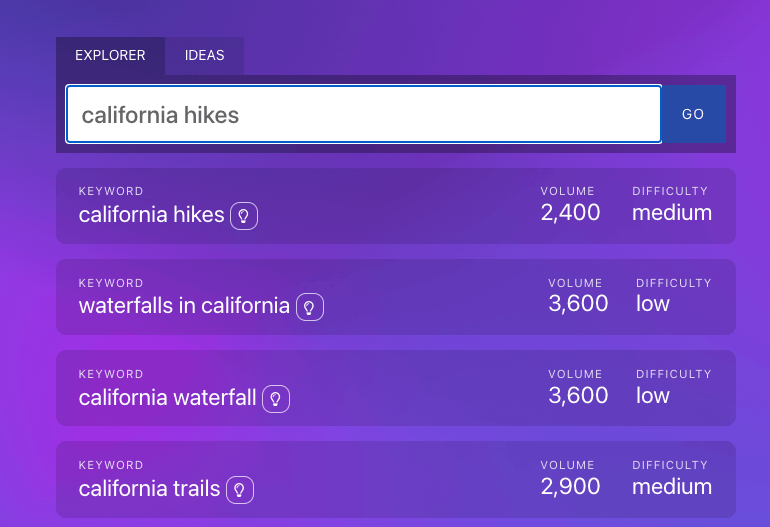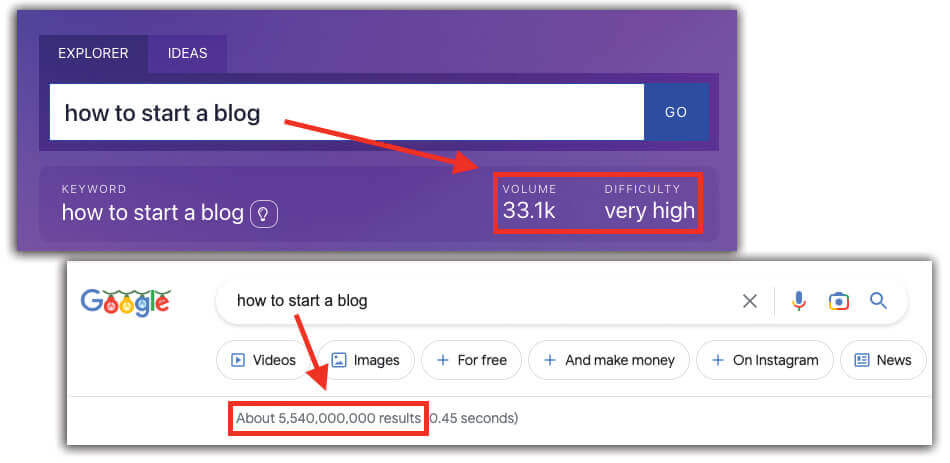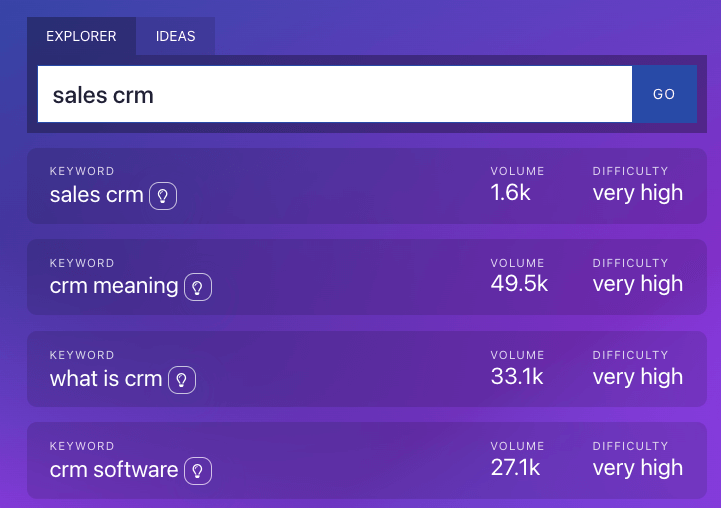ACCESS THE TOOL HERE - CLICK ME
Here’s why keyword research is important: If you start out by competing right away with entrenched websites who’ve been covering similar keywords for over a decade & working on their SEO, it’s highly unlikely your blog posts will outrank theirs. They’ve been doing it for much longer and likely have a lot of resources fueling their business.
Of course, your blog content mustn't only be well- optimized for on- runner SEO, but you ’ll also have to invest time & trouble into promoting your content in ways that ’ll attract backlinks, make the authority and responsibility of your website in the eyes of hunt machines like Google. More on that latterly 😊
What is a Keyword Research Tool?
A keyword exploration tool is a tool that helps you identify the right motifs & openings you should write about, by assaying keywords for hunt machine optimization( SEO) purposes. It’s the backbone of a proper keyword exploration process.
This free keyword exploration tool functions by codifying in a main keyword or expression, also it generates a list of affiliated keywords and their hunt volumes, competition situations and( soon) a rankability score. This data will help you identify the most effective keywords to use in your content & companion in optimizing your blog posts for hunt machines. Use the list of keywords to see how important estimated organic business you can anticipate to induce from applicable Google quests on the motifs you plug into the tool.

The stylish keyword exploration tools will show you these kinds of criteria
- Estimated Monthly Search Volume: Estimated yearly hunt volume is a metric that shows the approximate number of times a keyword or expression is searched for on a hunt machine per month. This is useful for relating the fashionability and implicit business of a keyword and determining its competitiveness.
- Keyword Difficulty: How delicate will it be to rank on the first runner of Google hunt results for this keyword? This is useful for relating the feasibility and implicit success of ranking for a keyword in hunt machine results.
- CPC (Cost-Per-Click): CPC( Cost- Per- Click) Cost per click is a pricing model used in online advertising like Google AdSense, where the advertiser pays each time a hunt clicks on an announcement( called PPC from the advertiser’s perspective). This pricing model is used on Google’s hunt machine results runners and the CPC for a particular announcement is determined by factors like the keywords, targeting, & competition. Advertisers can use CPC data to determine the implicit cost and return on investment of their advertisements over time.
- Country-Specific Results: Country-Specific Results Search volume and difficulty for just about every keyword expression will vary by country( where the hunt is located). By dereliction, all results from a hunt with this keyword tool will show US( United States) yearly hunt volume and keyword difficulty. still, there’s a dropdown menu near the hunt bar, where you can elect to see country- position data for any nation in the world, to help with your original SEO strategy.
The free keyword exploration tool we ’ve erected is designed to not only show you exactly how important estimated yearly hunt volume there's for a particular keyword, keyword expression or content — but to also show you how delicate it ’ll be to rank on the first hunt machine results runner( SERP) for that keyword. You can see these data points for any country in the world. After feedback from my compendiums , we decided to hide the CPC criteria that show you bring- per- click to run Google advertisements and be competitive in top placements for these keywords — substantially because bloggers do n’t really watch about CPC.
How to Optimize Your Blog Posts for Google Search (SEO) with this Keyword Planner
Now that we ’ve covered the basics of keyword exploration & what this keyword diary tool can help you negotiate, let’s dive into the exact strategies that ’ll help optimize your blog content to rank for new keywords & rank advanced in organic hunt queries moment.
1. Do Keyword Research to Be Sure You’re Pursuing the Best Keywords
The stylish keywords to pursue for your blog( especially if you ’re fairly early on in your blogging trip), are going to be as close to the crossroad of medium to high hunt volume and low keyword difficulty.
As a professional blogger of further than a decade, I ’ll be the first to tell you that chancing the right keywords that fit in that frequently narrow gap of medium hunt volume and low competition, can be a bit of a challenge. This means that numerous of the stylish keywords you ’ll pursue are going to be what’s considered long- tail keywords.
Long- tail keywords are great, because there are nearly always a significantly lower number of hunt results on a particular SERP( Hunt Machine Results runner). still, also keyword data is going to be incredibly important for you to keep an eye on, If you ’ve done your schoolwork and have a blog strategy — or content strategy — that you ’re executing on to grow your content marketing ROI.
2. Look for Medium Search Volume & Low-Competition Keyword Ideas
The real utility of a keyword tool, is in showing you the right keyword expressions to target for your blog content. Sure, it makes sense to pursue the most popular blog post ideas millions( indeed billions) of people search for answers about, but unless your blog is veritably well- established & largely authoritative, it’s going to take times of devoted trouble promoting that content in order to see the organic hunt business you ’re hoping for.

Focus utmost of your time on pursuing keyword expressions at the crossroad of medium hunt volume and low competition wherever possible. That’s the sweet spot for actually getting business snappily. Because if you want to make instigation( and provocation), you need real people visiting your blog soon. You wo n’t ever get to a place of being suitable to contend with settled websites who ’ve been in your niche for 10 times, until you lay the foundation for early business growth with realistic keywords you can rank for soon.
Then are the business ranges we( generally) use to define low, medium, high and veritably high hunt volume with my free keyword tool Low Hunt Volume 0 to 1,000 yearly quests Medium Hunt Volume 1,000 to 5,000 yearly quests High Hunt Volume 5,000 to 10,000 yearly quests veritably High Hunt Volume 10,000 yearly quests Understand where your blog is at in the grand scheme of its development — if you ’re fairly new or in the middle of your trip, the maturity of your organic hunt business will come from these low & medium hunt volume keywords. Invest in your blog’s future with further competitive( advanced volume) keywords, but know that it ’ll take months — or in utmost cases, times, to start ranking for High & veritably High competition keyword expressions.
3. Evaluate the Metrics to Find Relevant Keywords
When you class in a hunt term with this free keyword tool, you ’ll incontinently see dozens of affiliated keywords and recommendations for other keywords you should consider writing about.

The stylish keyword exploration tool is further than just another part of your free SEO tool mound. It’s the foundation of making sure you ’re blogging about the right keyword ideas in the first place. Taking the illustration above of a hunt for “ Deals CRM, ” an extremely competitive keyword expression, you ’re incontinently shown dozens of options for affiliated keyword expressions — numerous of which are less competitive than just these top results.
Search Volume: Number of Monthly Google Searches for a Keyword
As we touched on above, the Search Volume metric in this free keyword tool displays the number of estimated monthly searches on Google for the corresponding keyword phrase. It’s your proxy for how popular a given keyword phrase is (or not).
Keyword Difficulty: How Hard it Will Be to Rank for this Keyword
Keyword Difficulty gives you an estimate of how challenging it’ll be to rank for the corresponding keyword phrase. With this free keyword research tool, you’ll be presented keywords with these difficulty scores:
- Low: Most blogs (even relatively new sites) should be able to quickly compete on this keyword phrase
- Medium: Well-established blogs will compete quickly on these keywords, but newer blogs will need to put a meaningful amount of effort into promoting their content & naturally building backlinks with strategies like guest blogging & writing for publications to increase your organic search rankings.
- High: This should be your stretch goal level of difficulty to aim at ranking for within the next 6 to 12 months if you’re investing a lot of time and effort into growing your blog. It’ll be a challenge to rank for these terms, no doubt. But if you’re consistently promoting your blog content for months, you can expect to see some movement and first page of organic Google search result rankings on high difficulty terms, depending upon your how authoritative your blog is in the eyes of search engines.
- Very High: There’s no way around it, you’ll be competing with extremely well-established websites & businesses that have a vested interest in defending their search rankings for these keywords. Often, you’ll be going up against companies that generate millions (or billions) in annual revenue. It’s not impossible to rank for very high difficulty keyword phrases—my blog ranks for many of them—but it’ll take A LOT of time, effort and high quality backlinks from very high authority websites in order to get there. Think years of investing time, effort and resources.
In most cases, the difficulty level can be boiled down to how many backlinks your blog post can attract from other authoritative blogs, website & publications. One of the primary ways Google’s search algorithm determines which content pieces should rank at the top of search results, is authority. And authority is largely defined by the number and quality of links your content has from other authoritative (trustworthy) websites.
Bonus: Use My Free SEO Checklist Alongside this Keyword Planner Tool
Once you’ve used my keyword research tool to decide what to cover for your blog, you’ll need to actually to write the blog post. Then, it’s time to optimize your articles for maximum organic search ranking ability (also known as search engine optimization, or blog SEO).
Here’s my step-by-step SEO checklist to use before hitting publish on a new blog post:
- Be sure to install and use the Yoast plugin for WordPress
- Double check you’re writing about a useful keyword phrase for your readers
- Optimize your headers to encourage rich snippets and quicker indexing
- Make sure you only have an H1 header once (your post title at the top)
- Follow proper header hierarchy (H2 sub-header sections with H3 subtopics within)
- Use your primary keyword phrase naturally in-text (keyword density)
- Include a healthy mix of internal and external links (at least 3-5 external links)
- Write an enticing, keyword-rich meta description that’ll attract readers
- Use image alt descriptions to your advantage (with keyword rich descriptions)
- Decide on an appropriate length for your blog post (usually at least 1,500+ words)
- Write an SEO (meta) title that’s designed to rank (use my blog title generator tool)
- Place your keywords in the slug / URL / permalink (see my permalinks guide)
Incorporating these foundational SEO best practices into your writing process will help immensely when it comes to optimizing your content & ranking high in Google search over time. And the more you apply these strategies to long-tail keywords, the quicker you’ll see more traffic from relevant keywords in your niche.
The Features of This Free Keyword Tool for Bloggers
We’ve explored a lot already, but let’s quickly touch on the features of my free keyword tool.
Keyword Explorer (Estimated Search Volume)
The purpose of the Explorer tab of this free keyword research tool (the default tab you’ll land on) is to show you the two most important SEO metrics when deciding which keywords to pursue in your blog content strategy:
- Monthly Search Volume
- Keyword Difficulty
With these two metrics, you can make an informed decision about which keyword phrases to pursue for your blog. As we’ve covered, I always recommend a strategy of focusing primarily on medium search volume and low competition keywords—with a smaller proportion of more competitive terms that offer longer-term traffic value as your blog grows & becomes more authoritative.
Keyword Ideas (Suggested Blog Topics & Ideas)
Rather than just typing in popular keywords and hoping to compete against a sea of well-established sites, we built this keyword generator to show you less competitive keywords to write about—while still giving you the opportunity to generate meaningful organic traffic.
.png)